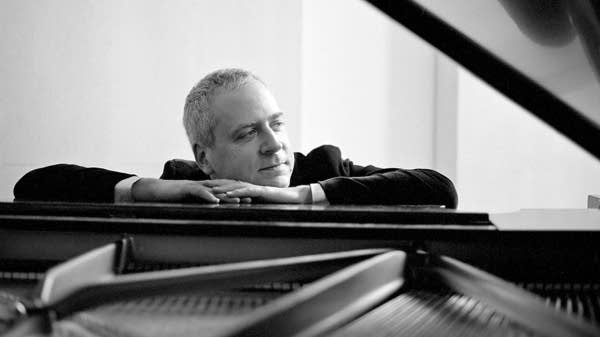Jeremy Denk — c.1300-c.2000 — (Nonesuch)
"You know, we often talk about classical music like it's a bin in the record store or a category, you know. And I think that part of my goal was to remind people of the tremendous time span of classical music and the way the people worked, in a way, on top of each other. One step at a time to find style after style."
A few years ago, pianist Jeremy Denk put together an 80-minute recital at Lincoln Center which spanned 700 years of Western music. It wasn't a stunt. He was sharing a thought-provoking story of the constantly emerging possibilities of musical styles and expression. On his new recording, c.1300-c.2000, you can experience the evolution of this musical arc through the voices of 24 different composers.
"There's something about the development of style over all that time — constant attainment and constant loss. So it has this life and death feeling, which is why the dates — I wanted it to look a little bit like the dates of being born and dying, which is a kind of a bummer, but..."
It is sort of, though, related to a midlife crisis or two or three which you have related to in the liner notes about the recording?
"They asked me about what sort of project I was interested in, and I had to tell them that I felt, as I was in middle age, that music history, the sweep of it, felt more important to me than it had. I loved it — it was a cool thing when I was a student in Oberlin when I was 16, 17 — and it sort of passed out of my consciousness for a while like classes often do, and then I started thinking about it more, the unfolding story of all those centuries.
"The beginning — it's about counterpoint. You know, what happens when you take a Gregorian chant and then you put a second voice with it? How did the voices, and what do we do with the third voice? You know, so the first three tracks are two voices and then three voices and then four voices. Then again two voices. I tried to feel like, how do the composers begin to explore these different voices singing together. And what that does."

It's also interesting because you were choosing songs as opposed to pieces that were written for keyboard, right?
"I learned while I was doing the CD that the organ existed as early as 900, which shocked me. There were keyboard instruments, but you know the music that's most representative of that period is vocal music, always. That's why I say more than one voice. It started with a plainchant or a Gregorian chant and then they'd add a voice with it, you know, doubling it or shadowing it or anchoring it, and then gradually the voices become more and more independent you know. And that's part of the story."
I like the way the Scarlatti comes in. And it's introducing a whole new form. It has this brightness to it, a little more levity, perhaps?
"I tried in the first half that it wouldn't be all austere and contemplative. There are these moments — there's a little Janequin piece, which is charming — there's Scarlatti is, yes, funny. The role of wit in music."
Then in the second half we have sort of the calmness and familiarity of Mozart, and then Beethoven puts the end to that, pretty quickly.
"Well this is the problem with rocketing through music history in 80 minutes. That's the amazing thing about Mozart, Haydn, and Beethoven — they wrote in a style that had instability built into it. So, I tried to capture all that in two pieces."
And Then we have those two enemies of the Romantic era, Wagner and Brahms, represented back to back.
"So, you have Wagner, Brahms, the two enemies of the 19th century, both describing the collapse of harmony, and then Schoenberg takes us over the edge, and then we're atonal. It's like all the forces of romanticism are suddenly wandering the zoo, they've been let out of their cages, and then they go, do all these crazy things, unleashed."
To hear the rest of my conversation, click on the extended interview above, or download the extended podcast on iTunes or wherever you get your podcasts.
Resources
c.1300-c.2000 (Amazon)
Love the music?
Show your support by making a gift to YourClassical.
Each day, we’re here for you with thoughtful streams that set the tone for your day – not to mention the stories and programs that inspire you to new discovery and help you explore the music you love.
YourClassical is available for free, because we are listener-supported public media. Take a moment to make your gift today.
Your Donation
About New Classical Tracks®
Host Julie Amacher provides an in-depth exploration of a new classical music release each week.
Subscribe on Apple Podcasts, Spotify, Radio Public, or RSS.











